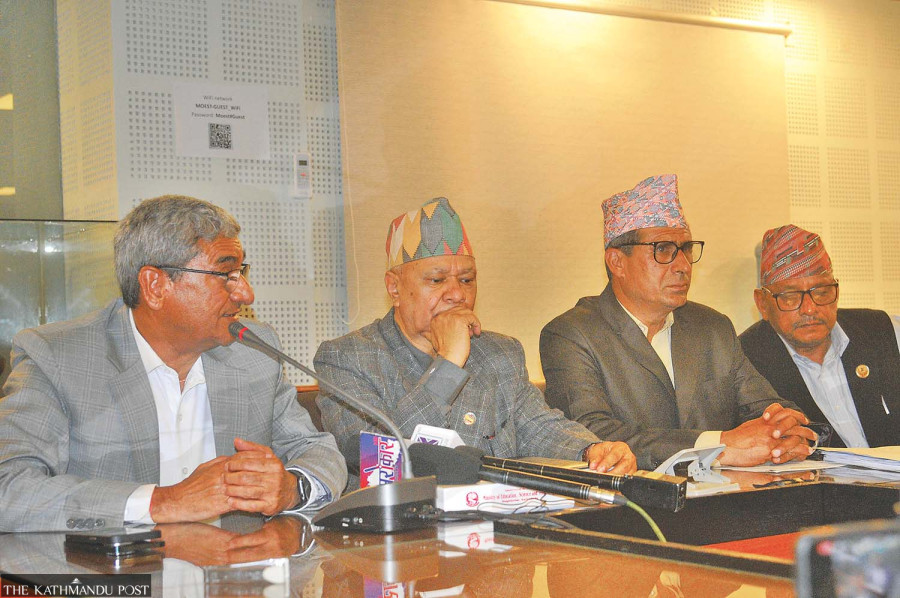National
Education minister’s indifference pushes School Education Bill into uncertainty
Nepal Teachers’ Federation has warned of a protest if the bill is not endorsed this week.
Post Report
After frequently deferring the deadline to endorse the School Education Bill, Education Minister Raghuji Pant has shown indifference in resuming discussions on the bill.
The meetings of the Education, Health and Information Technology committee of the House of Representatives, called to endorse the bill, were deferred three times earlier at the government and ruling parties’ demand. No meeting has been called after the one on July 6 was postponed following the request from Education Minister Raghuji Pant and Nepali Congress chief whip Shyam Ghimire.
“On July 6, the committee had given five days to the minister. Ten days have passed but the discussion has not resumed as he is not responding to our request to commence the meeting. We cannot discuss the bill without the minister’s presence,” said Ammar Bahadur Thapa, chairperson of the House committee. “Now the committee will put the School Education Bill on hold and start discussions on the Media Council Bill.”
An official at the House committee said they are preparing to call the meeting for Sunday to discuss the council bill.
“It seems the education ministry wants to take more time before resuming the discussion in the School Education Bill,” said Dashrath Dhamala, secretary at the committee.
The school education bill has been left in uncertainty while the Nepal Teachers’ Federation has warned of a protest if it is not endorsed by Parliament this week. A meeting of the federation, earlier this week, had concluded that the chances of the bill getting endorsed, including its concerns, are slim.
Issuing a statement after the meeting, the federation said that the government’s response during the discussion highlights its dismissive attitude towards the teachers and staff.
“It [government] is least concerned with the agreements made with the federation, the educational needs of the country, or addressing existing problems,” the statement reads. “Therefore, after carefully analysing the current situation, we have concluded that the possibility of a progressive Education Act that is friendly to schools, students, teachers, and staff is gradually diminishing.”
The federation has accused the committee of distorting and disregarding past agreements and advancing provisions that go against the sentiments of teachers and staff, the dignity of the teaching profession, and the goal of empowerment.
“The government has shown no seriousness or responsibility regarding crucial issues such as the permanency of all temporary teachers, promotion of permanent teachers, departmental actions, constitutionally guaranteed trade union rights, teacher transfers, management of school staff, management of early childhood education teachers, management of institutional school staff, resolution of problems faced by conflict-affected teachers, and alignment and management of teacher positions,” the statement says. “The government also appears unaware of the increasingly provocative and adverse situation. The federation has concluded that there is a need for a stern protest to address the past agreements.”
Federation officials say they will wait until Friday before announcing the fresh protest.
Ghimire and UML chief whip Mahesh Bartaula in March had agreed in writing to get the bill endorsed from the lower house by June 29. The school teachers and staff had withdrawn a month-long protest following the agreement.
If the committee chair’s claim is anything to go by, the bill addresses most of teachers’ demands, except those relating to promotion.
The subcommittee, led by UML lawmaker Chhabilal Bishwakarma, had agreed that third-class teachers would be eligible for periodic promotion after 10 years of service and second-class teachers after 12 years.
The subcommittee, which submitted its report to the committee on May 18, also agreed that only those who scored 90 marks in the evaluation would be eligible for promotion.
The federation has been pressured to remove the scoring requirement.
After regular discussions for over a month, the Bishwakarma-led panel found agreements on more than 1,700 amendments proposed to the bill, several of which were mutually contradictory. However, the government, under the federation’s pressure, altered many of them.
The school education bill is among the most crucial for fully implementing the Constitution of Nepal, the decade-old charter that devolves many powers to the local governments.




 10.12°C Kathmandu
10.12°C Kathmandu














